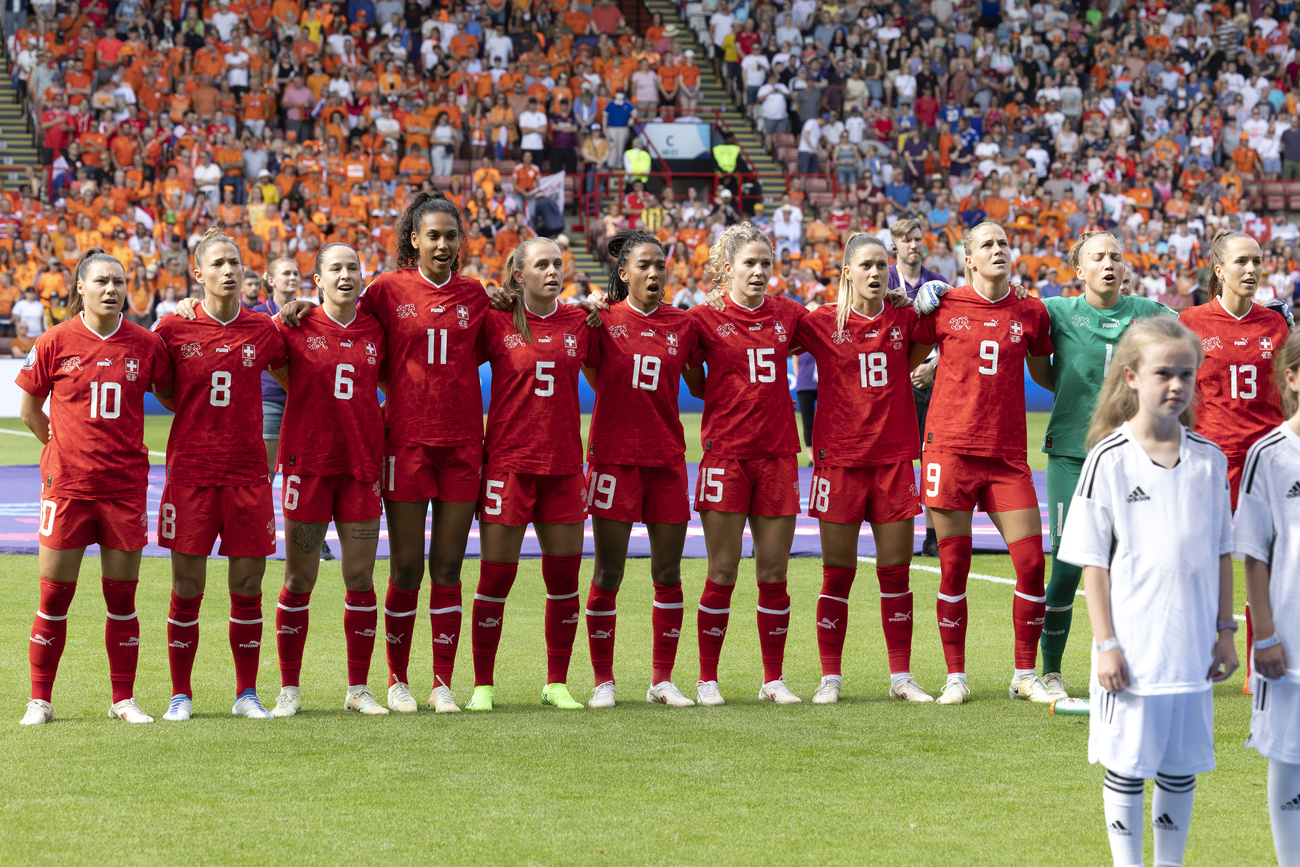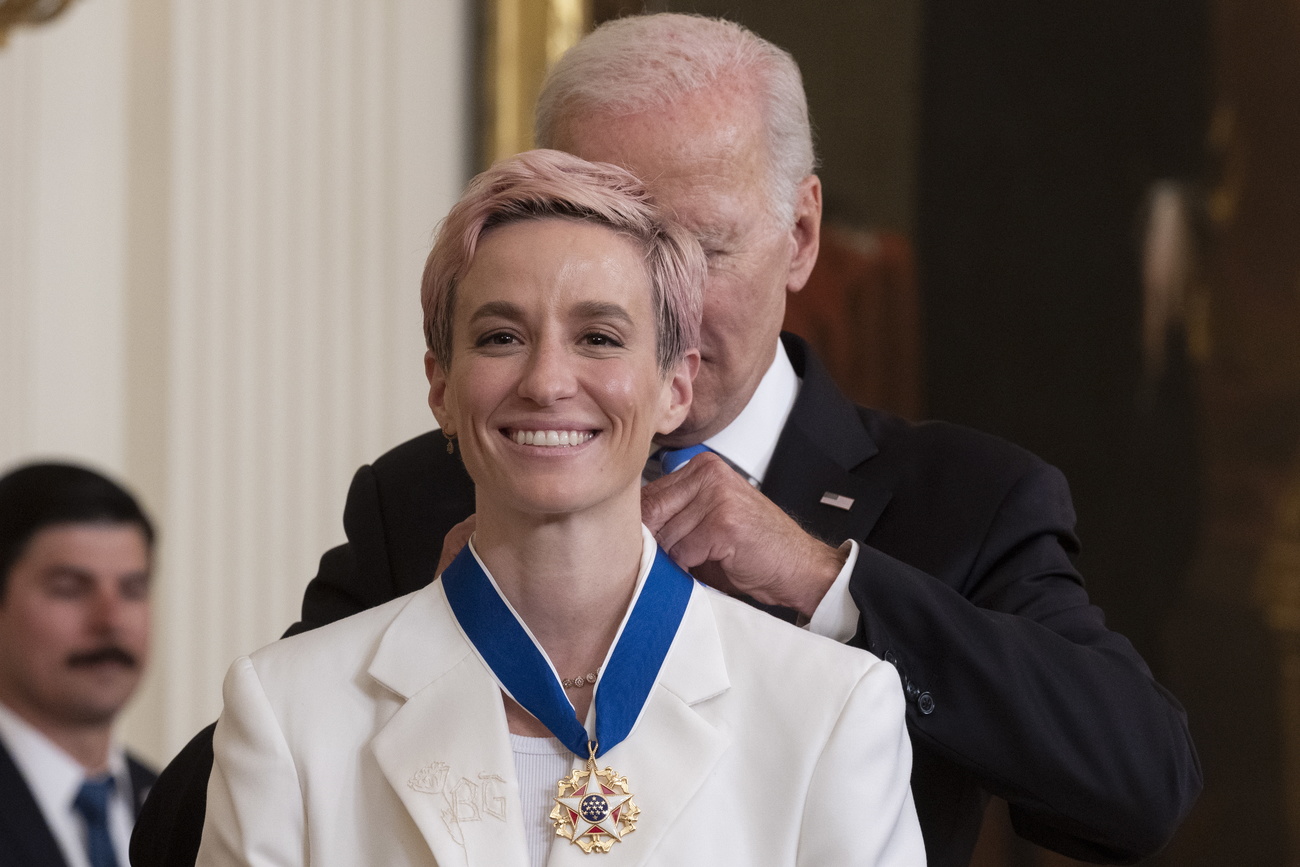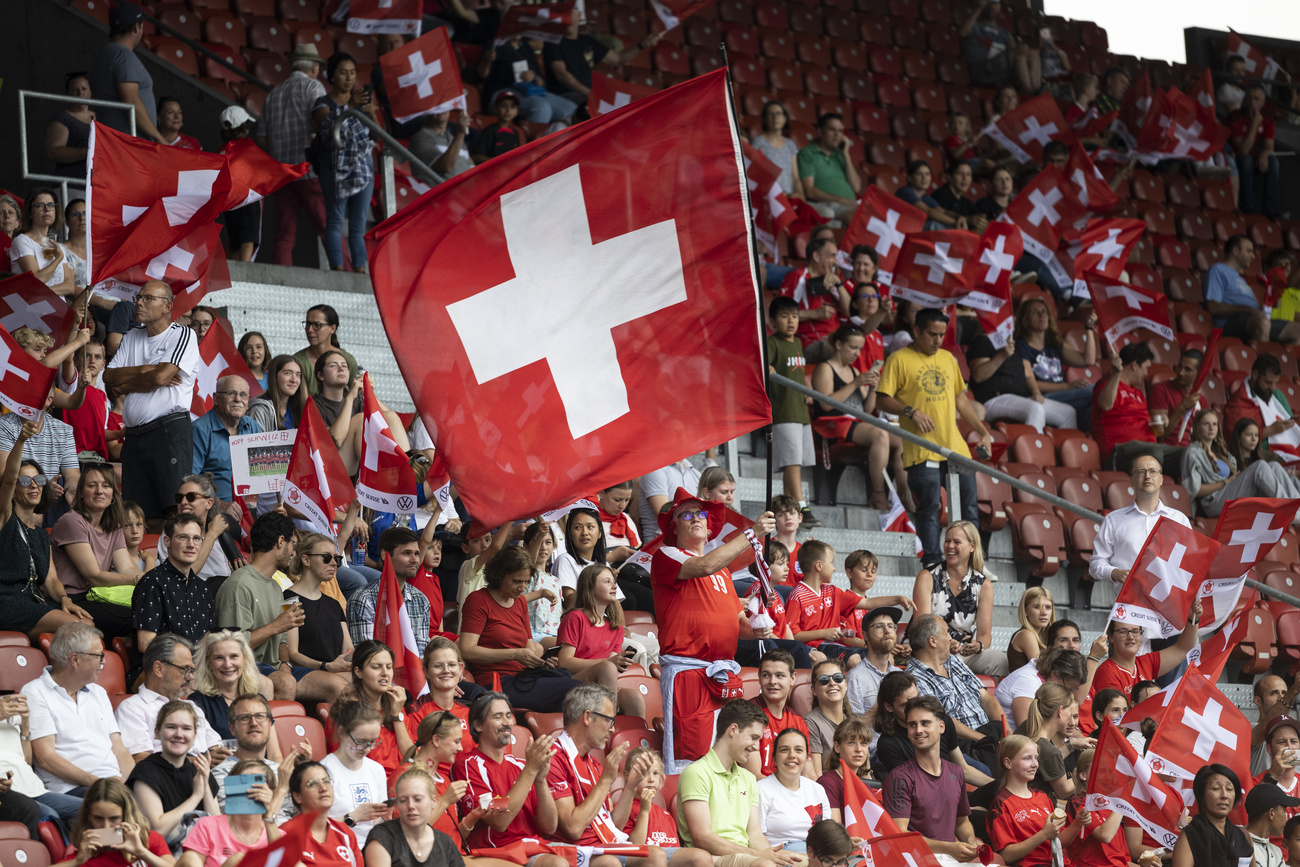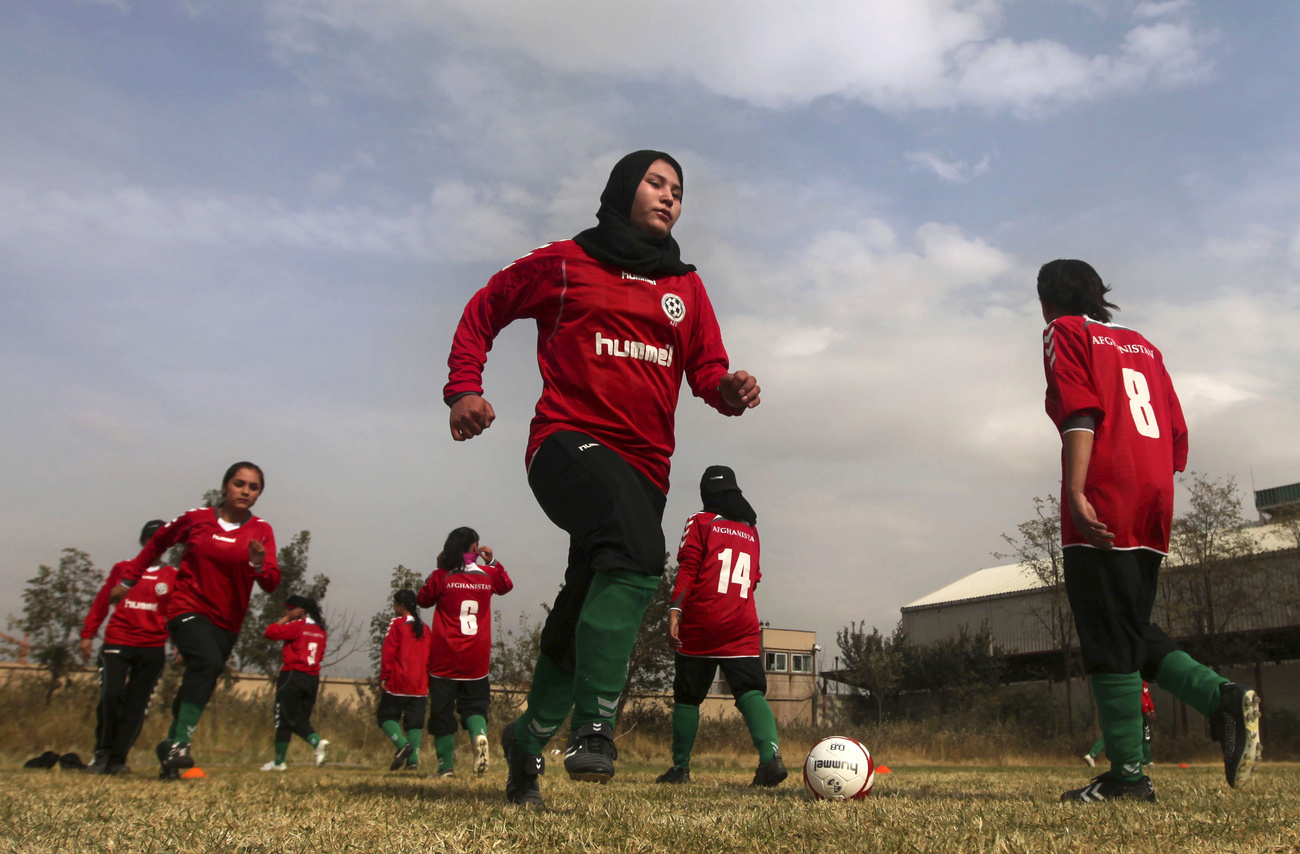Men’s and women’s football: same play, different pay

The UEFA Women’s Euro 2022 tournament may have ended, but the issue of female footballers’ pay in Switzerland continues.
The Swiss women’s national football team’s dream of doing well in Euro 2022 was shattered last month when they were beaten 4-1 by the Netherlands in the first round. They also fell in the first round in the previous tournament in 2017, the first time Switzerland had qualified for the European championships. Nevertheless, this year they did take a step forward: they can now expect higher salaries.
Just before the tournament the Swiss Football Association (SFA) and the team’s main sponsor Credit Suisse announced that women would be paid the same match bonus as their male counterparts – so four-and-a-half times what they had previously been given. These bonuses are paid when a team qualifies for a tournament, reaches the quarterfinals or ends up lifting the trophy. The SFA has also adapted the remuneration for image rights, which means women will make as much as men when they appear in an advert, for example. The SFA has not disclosed the exact amount for reasons of confidentiality and data protection, said association spokesperson Dominik Erb.
In September 2021 UEFA, European football’s Swiss-based governing body, doubled the prize money from what had been offered in 2017. The 16 qualifying nations at Euro 2022 had €16 million (CHF15.6 million) to share. This means that in addition to the daily allowance paid by the SFA each team was guaranteed €600,000. This may be a step closer to equal pay, but the income disparity between female and male footballers remains enormous. The most recent men’s European Championships, Euro 2020, saw €331 million in prize money distributed among the teams, with each team receiving €9.25 million just for taking part.
Interpretation of fairness
“The increase in prize money is only one of the many steps we’ve taken to strengthen and promote women’s football,” said a UEFA spokesperson. Standards had improved significantly since the last tournament, they said. At the same time, UEFA said it wants to work more sustainably: “the financial commitment should reflect the income and cost for each tournament.”
The discussion around equal pay in football also brings to light different interpretations of fairness. Men’s matches obviously generate a lot more money than women’s matches, which are often in the red. The men’s game attracts more fans to stadiums and more viewers to television screens, and retailers are more likely to increase their sales of garden furniture, barbecue accessories and sunscreen during a tournament featuring men. Male footballers face fiercer competition and have to fight harder to get to the top. The enormous publicity also means more pressure.
Some people say they find the men’s game simply more attractive: men run faster and are stronger than women, which makes their matches more intense. But does this justify the enormous pay gap between male and female footballers, especially for national teams?
“In this case the understanding of fairness follows a market logic according to which only demand determines the value of a service,” sports sociologist Karolin Heckemeyer wrote in her editorial for the magazine Fussball and Gesellschaft (football and society). Heckemeyer is the co-editor of the magazine and lectures at the University of Applied Sciences and Arts Northwestern Switzerland.
It is also a given that the level of demand is based on the quality of the service provided, she says, adding that even enormous differences in income and resources are therefore legitimate. “The financial situation of women’s football can only improve if its market value increases,” she said.
US pioneers
However, performance and fairness can be interpreted differently, Heckemeyer points out. She takes the example of Norway, where equal pay and prize money for female footballers was introduced in 2017.
The Norwegian Football Association argued that the value of a team’s performance did not depend on demand but on the training and time athletes invest in their sport as well as their performance. The Norwegians are convinced that conditions and opportunities can be equal only if women achieve financial parity with their male counterparts. More money would not only increase a player’s salary, it would also improve the infrastructure, the training of coaches, youth development as well as club and grassroots football.
The United States national women’s football team have also battled for equal pay for many years. The pay gap in the US was even larger than in Europe even though the national women’s team generates more money and attracts more spectators than the national men’s team. But when the women won the World Cup in 2015, they received only $2 million (CHF1.9 million) as prize money while their male colleagues pocketed $9 million for their 11th place at the 2014 World Cup.
After the US women won the World Cup again in 2019, they intensified their fight for equal pay, which resulted in a $24 million discrimination settlement earlier this year. Their struggle also ensured that in future all funds from FIFA, world football’s Zurich-based governing body, are thrown into the same pot and distributed equally to male and female footballers.

Exception to the rule
The enormous gender pay gap exists in most major sporting tournaments, with the exception of tennis’s four Grand Slams. More than 50 years ago the US Open introduced equal prize money for men and women, and a few years later, the French Open and the Australian Open followed suit. Wimbledon finally caught up in 2007.
The change in tennis did not happen overnight. The US tennis player Billie Jean King got the ball rolling when she formed the Women’s Tennis Association in 1973 and created a tennis culture for women that did not derive its legitimacy from being constantly compared to men’s tennis.
This raises the question why the gender gap in football still exists. Is it really the natural physical advantages men have over women that make a game more exciting? Or can’t there be different but equal versions of a sport? After all, the players of a local football club in the Bernese Oberland are unlikely to play as well and run as fast as their colleagues from Manchester City or Bayern Munich but that doesn’t diminish the passion of their fans.
Waiving wages
The Women’s Euro 2022 has given women’s football another boost, internationally and in Switzerland.
“More than 10,000 spectators watched the friendly between Switzerland and England [at the Letzigrund stadium in Zurich in June],” says Erb at the Swiss Football Association. “We’ve never seen such a big crowd.” (England won 4-0.)
In April the women’s Cup Final between FC Zurich and Grasshopper Club Zurich attracted nearly 8,000 fans, a new record. Also, the number of registered female footballers has increased in Switzerland over the past few years and now stands at around 30,000.

When it comes to female coaches, referees and club officials, there is still a lot of unused potential, according to Erb, but the SFA is trying its best to keep women in the sport. Not only has it appointed Tatjana Hänni as the first woman to its board of directors, it has also introduced opportunities such as entry-level courses for female coaches in the senior national team.
No footballers – male or female – earn their living by playing for the national team. They do that by playing for clubs, who pay the big stars enough for several lifetimes.
As the money earned by professional male footballers in a European Championship or World Cup represents only a fraction of their income, the discussion about income redistribution, or trying to get them to waive their wages, is back on the table.
The Swiss Football Association has not yet discussed such an option, Erb says. But for many female footballers a higher income could help them focus exclusively on their sporting careers.
Translated from German by Billi Bierling/ts

In compliance with the JTI standards
More: SWI swissinfo.ch certified by the Journalism Trust Initiative













You can find an overview of ongoing debates with our journalists here . Please join us!
If you want to start a conversation about a topic raised in this article or want to report factual errors, email us at english@swissinfo.ch.